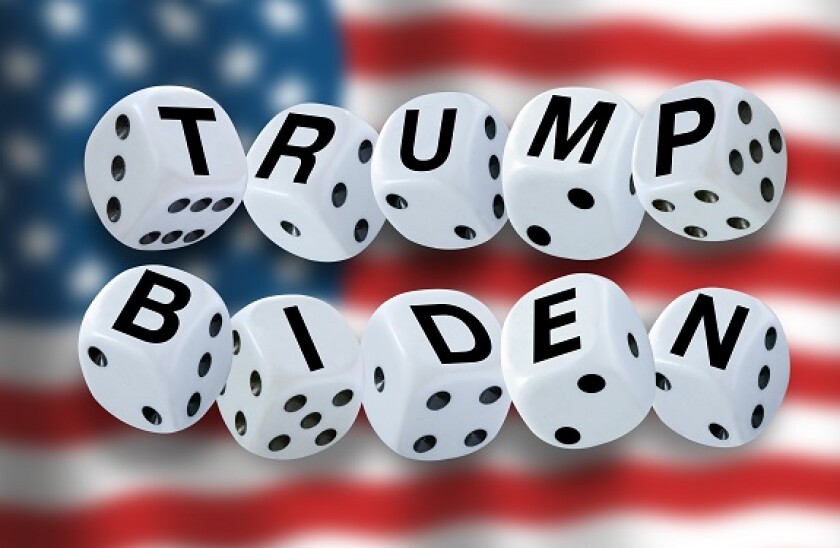What a whirlwind four-year period it has been under outgoing US president Trump, who was set to be succeeded by Joe Biden on Wednesday. Trump’s term will be remembered for a lot of things — the Twitter bluster, the chaotic transition period, the fact that Trump became the first president to be impeached twice. But the lasting impact will be his hard turn against China.
Even in the final days of the Trump administration, the US continued taking aim at some of China’s highest profile companies. The US ministry of commerce, for instance, put oil major China National Offshore Oil Corp on its entity list last week, meaning US groups will no longer be able to export products or technology to the firm without a hard-to-get license.
The Department of Defense made a similar move last week too. Its target was smartphone making giant Xiaomi, alongside eight other firms, which were included on a list of businesses with alleged ties to the Chinese military.
From a capital markets point of view, the Xiaomi news is critical given American investors are banned from investing in companies included on this military-linked list. If US investors already have positions in these firms, they will have to divest their holdings by November 11, 2021.
The latest developments followed a spate of other recent moves. In the middle of this month, the commerce department finalized new rules that make it easier for the government to block Americans from importing technology from China. This implements an order signed by Trump in 2019 to protect some of the US’s supply chains.
In November last year, Trump signed an executive order banning US investments in a host of Chinese firms that were allegedly owned or controlled by the country’s military. That move resulted in the New York Stock Exchange delisting three large Chinese telecommunication companies from the bourse early this month — but only after flip-flopping on its decision twice.
The moves against China have come from a variety of different government departments and regulators, but they formed a clear picture of a president determined to re-assert US power against the threat from China.
Will the Biden administration continue this strong stance against China? Most economists think Biden may choose a more diplomatic course – particularly by working closer with key trading partners to come up with a multilateral response – but the wider trend is unlikely to change. Antony Blinken, Biden’s nominee for secretary of state, has said Trump was right to be tough on China.
“I disagree very much with the way that he went about it in a number of areas, but the basic principle was the right one, and I think that’s actually helpful to our foreign policy,” he said.
Those words should worry US bankers used to a steady stream of deal flow from China.
Firms that have recently been sanctioned by the US are among the key clients for banks in Asia. Xiaomi tapped the ECM for a nearly $4bn top-up placement and concurrent convertible bond in December. Of the four banks running the trade, three were US banks — Goldman Sachs, JP Morgan and Morgan Stanley — working alongside Credit Suisse. When Cnooc sold its $1.5bn bond in September 2019, Citi, Goldman Sachs and JP Morgan were the global co-ordinators, alongside Bank of China and UBS.
Will the US banks be able to work with the blacklisted firms again, should they need capital markets access? They will need to tread carefully – and that will mean giving up on fruitful opportunities in the capital markets. Huawei, for instance, has a $1bn bond maturing in February 2022, a $1bn deal maturing in 2025, a $2bn bond maturing in 2026 and a $500m note due in 2027. The firm was forced to turn to China’s onshore bond market for some funding in late 2019 after being singled out by the US that year.
There is still a chance that the Biden administration will undo some of the measures taken under Trump. But that will lead to near-term uncertainty that may be even worse than the steady flow of bad news under Trump. Banks may turn down deals in the early days of the Biden administration for fear of a political backlash that never comes. There is going to a lot of guesswork over the coming weeks and months.
US policy against China is just one problem these banks will face. Just as challenging – and even less predictable – will be how China handles its own large corporations. One only needs to look at the high-profile cancellation of Ant Financial’s landmark IPO last November, or the recent investigation into tech darling Alibaba Group Holding: the biggest opportunities in China are also those most fraught. Chinese policymakers may be eager to let flowers bloom – but they are also wary of them growing too high.
It is clear that China still offers huge opportunities for global banks. It also promises major headaches.

